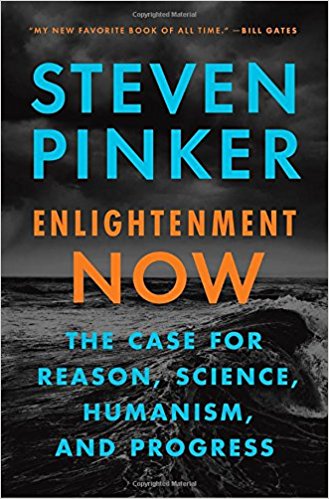You have /5 articles left.
Sign up for a free account or log in.
 Enlightenment Now: The Case for Reason, Science, Humanism, and Progress by Steven Pinker
Enlightenment Now: The Case for Reason, Science, Humanism, and Progress by Steven Pinker
Published in February of 2018.
Let’s get one thing out of the way. With Enlightenment Now, Steven Pinker has written the best book on progress that is currently in print. Or e-book. Or audiobook.
That is no little accomplishment.
There are just so many books about why our world is getting better, and why our kids and our grandkids are likely to lead better lives than us. My favorites in the progress genre include:
- It's Better Than It Looks: Reasons for Optimism in an Age of Fear by Gregg Easterbrook (2018 - click on link for my review)
- Progress: Ten Reasons to Look Forward to the Future by Johan Norberg (2016 - also reviewed)
- The Great Surge: The Ascent of the Developing World by Steven Radelet (2013 - reviewed)
- The Great Escape: Health, Wealth, and the Origins of Inequality by Angus Deaton (written in 2013, my review is from 2018)
- Abundance: The Future Is Better Than You Think by Peter H. Diamandis and Steven Kotler (2012 - Amazon link)
- The Rational Optimist: How Prosperity Evolves by Matt Ridley (2010 - Amazon link)
I’ve just started reading the late Hans Rosling’s new book Factfulness: Ten Reasons We're Wrong About the World--and Why Things Are Better Than You Think. Maybe Rosling's book will dethrone Pinker’s Enlightenment Now as the one book to recommend if you could read any book on the history and future of progress. But I doubt that will be the case. When it comes to writing, Pinker brings a gun to every knife fight.
The quality of Enlightenment Now does not solely rest Pinker’s dexterity with words, sentences, and paragraphs. Pinker brings the data. If you read his book The Better Angels of Our Nature: Why Violence Has Declined (2011), then you know about Pinker’s facility with evidenced-based arguments. Extend this data-rich methodology from violence decline to long-term economic growth, poverty reduction, health and longevity improvements, and economic mobility - and you have an idea of Pinker’s approach.
Crucially, Pinker does not rely solely on data to make his case. He dives deeply into the psychology of our systemic blindspots, and the history of thinking about the idea of progress. By situating the story of material improvement in the larger story about how thinkers have thought about progress, Pinker helps us understand why there continues to be such cognitive and political resistance to the ideas and practices that explain and lead to human betterment.
There are some areas in Pinker’s progress narrative that I’d love to debate him about. Pinker seems to be less concerned than warranted about our increasingly stratified opportunity structure. It is one thing to worry less about the growth of economic inequality. It is another thing altogether to discount the negative consequences of an economy and a society, including elite higher education, that concentrates privilege. (I don’t remember anything about public disinvestment in postsecondary education in Enlightenment Now - but maybe I'm misremembering).
These complaints are small beer in relation to the accomplishments of Enlightenment Now. The real readers for this book should be those progress skeptics amongst us. I’d very much like to hear a smart critique of Pinker’s main arguments and conclusions.
What are you reading?




